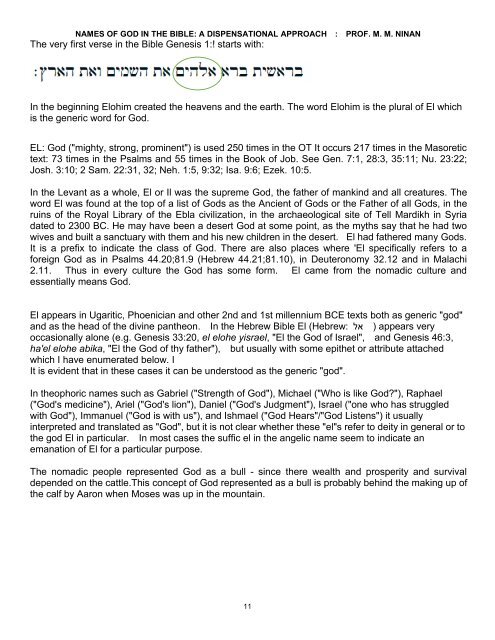THE NAMES OF GOD
You also want an ePaper? Increase the reach of your titles
YUMPU automatically turns print PDFs into web optimized ePapers that Google loves.
<strong>NAMES</strong> <strong>OF</strong> <strong>GOD</strong> IN <strong>THE</strong> BIBLE: A DISPENSATIONAL APPROACH : PR<strong>OF</strong>. M. M. NINAN<br />
The very first verse in the Bible Genesis 1:! starts with:<br />
In the beginning Elohim created the heavens and the earth. The word Elohim is the plural of El which<br />
is the generic word for God.<br />
EL: God ("mighty, strong, prominent") is used 250 times in the OT It occurs 217 times in the Masoretic<br />
text: 73 times in the Psalms and 55 times in the Book of Job. See Gen. 7:1, 28:3, 35:11; Nu. 23:22;<br />
Josh. 3:10; 2 Sam. 22:31, 32; Neh. 1:5, 9:32; Isa. 9:6; Ezek. 10:5.<br />
In the Levant as a whole, El or Il was the supreme God, the father of mankind and all creatures. The<br />
word El was found at the top of a list of Gods as the Ancient of Gods or the Father of all Gods, in the<br />
ruins of the Royal Library of the Ebla civilization, in the archaeological site of Tell Mardikh in Syria<br />
dated to 2300 BC. He may have been a desert God at some point, as the myths say that he had two<br />
wives and built a sanctuary with them and his new children in the desert. El had fathered many Gods.<br />
It is a prefix to indicate the class of God. There are also places where 'El specifically refers to a<br />
foreign God as in Psalms 44.20;81.9 (Hebrew 44.21;81.10), in Deuteronomy 32.12 and in Malachi<br />
2.11. Thus in every culture the God has some form. El came from the nomadic culture and<br />
essentially means God.<br />
El appears in Ugaritic, Phoenician and other 2nd and 1st millennium BCE texts both as generic "god"<br />
and as the head of the divine pantheon. In the Hebrew Bible El (Hebrew: אל ) appears very<br />
occasionally alone (e.g. Genesis 33:20, el elohe yisrael, "El the God of Israel", and Genesis 46:3,<br />
ha'el elohe abika, "El the God of thy father"), but usually with some epithet or attribute attached<br />
which I have enumerated below. I<br />
It is evident that in these cases it can be understood as the generic "god".<br />
In theophoric names such as Gabriel ("Strength of God"), Michael ("Who is like God?"), Raphael<br />
("God's medicine"), Ariel ("God's lion"), Daniel ("God's Judgment"), Israel ("one who has struggled<br />
with God"), Immanuel ("God is with us"), and Ishmael ("God Hears"/"God Listens") it usually<br />
interpreted and translated as "God", but it is not clear whether these "el"s refer to deity in general or to<br />
the god El in particular. In most cases the suffic el in the angelic name seem to indicate an<br />
emanation of El for a particular purpose.<br />
The nomadic people represented God as a bull - since there wealth and prosperity and survival<br />
depended on the cattle.This concept of God represented as a bull is probably behind the making up of<br />
the calf by Aaron when Moses was up in the mountain.<br />
11


















